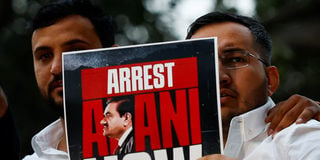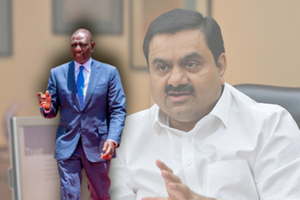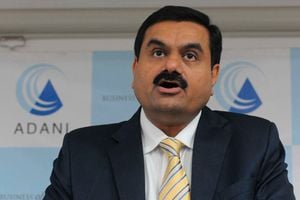
Supporters of India's main opposition Congress party hold placards during a protest against Indian billionaire Gautam Adani, after he was indicted in New York over his role in an alleged multibillion-dollar bribery and fraud scheme, in New Delhi, India, November 21, 2024.
Gautam Adani and his nephew orchestrated a bribery scheme that involved paying or promising to pay the equivalent of hundreds of millions of dollars in bribes to Indian government officials to secure their commitment to purchase energy at above-market rates that would benefit Adani Green and Azure Power, the US Department of Justice announced on November 20. This is not the first case or allegation against the Adani Group, but this is the most significant.
"This is not merely an unwarranted attack on any specific company but a calculated attack on India, the independence, integrity and quality of Indian institutions, and the growth story and ambition of India," Adani Group started its rebuttal to the allegations raised by the Hindenburg Report in an exhaustive report titled ‘Adani Group: How The World’s 3rd Richest Man Is Pulling The Largest Con In Corporate History’ in February 2023.
‘Soros Attack on India,’ Adani group and even ministers in the Indian government claimed after the first Organized Crime and Corruption Reporting Project (OCCRP) investigation I did on the Adani Group’s share market manipulation.
Adani Group is one of the biggest conglomerates in India. Gautam Adani, the chairman of the group is presumed to be close to Indian Prime Minister Narendra Modi, and Adani’s rise has been exponential since Modi came to power. Adani’s growth is even linked to India’s growth.
The group today is the largest private airport operator, the largest port operator, the biggest coal importer, the largest FMCG company, the largest private gas and electricity distributor, the largest manufacturer of cement, the largest renewable company and also thermal power generator in India.
Beyond India, Adani has been expanding its footprint at a fast pace with a clear link between Prime Minister’s visits and Adani gaining contracts in these countries. Scroll has analysed 12 such cases where there is a small gap between Prime Minister Modi’s visit and Adani Group gaining a contract in the country.
Allegations of corruption, over-valuation, money laundering, trade-based money laundering, offshoring, use of shell companies, complex offshore structures, proxies and front men, and also share market manipulation have clouded operations.
I was deeply involved in investigating financial misconduct involving the Adani Group over the last two years.
Our work uncovered serious allegations of stock market manipulation, offshore financial activities, and overcharging for coal imports, which I published through the OCCRP and shared with the Financial Times (FT) and The Guardian.
These findings revealed troubling practices with significant financial implications.
Through the investigation, we discovered that individuals closely linked to the Adani family secretly purchased large amounts of Adani Group shares through offshore entities.
This was in violation of the Indian regulations, as there is a limit for insider ownership of publicly listed companies to 75%. Documents accessed revealed that Nasser Ali Shaban Ahli and Chang Chung-Ling, both with close ties to the Adani family, traded hundreds of millions of dollars worth of Adani Group stock through offshore structures.
These transactions were linked to a company controlled by a Vinod Adani, the elder brother of Gautam Adani. This arrangement was a deliberate effort to manipulate stock prices and inflate the value of Adani companies.
The findings were corroborated by the Financial Times, which showed how offshore funds connected to the Adani family played a key role in boosting the group’s market valuation.
The Guardian too highlighted the larger implications of this, noting how it helped maintain control of the group’s public shares while inflating their market value.
Overcharging for Coal Imports In a second investigation, I exposed how the Adani Group overcharged Indian power companies for imported coal. I found evidence that coal purchased at $28 per metric ton, with a caloric value of 3,500 kcal/kg, was falsely labelled as higher-quality coal with a value of 6,000 kcal/kg and invoiced at $91 (Sh 11,739) per metric ton.
This fraudulent practice cheated Indian government power generation companies and consumers, creating financial losses while contributing to higher emissions due to low-quality fuel.
These overcharging practices were facilitated by offshore intermediaries, making it difficult to trace the true value of the coal. My reporting, supported by OCCRP and FT, revealed how the Adani Group sold coal at triple the market rates for dirty coal, generating enormous profits at the expense of India’s energy sector, and pollution due to burning dirty coal.
It is important to note that Adani is the biggest coal supplier in India to government, private as well as his own power generating companies, making the implications of the ‘coal fraud’ massive.
These investigations were challenging, taking years of work exposing patterns of financial misconduct and regulatory evasion by one of India’s most powerful conglomerates.
The findings raised serious questions about corporate governance and accountability, putting the spotlight on regulatory authorities. Adani Group has denied all allegations and got a clean sheet from the Supreme Court of India under controversial circumstances.
The Securities and Exchange Board (SEBI) of India, the share market regulator, and watchdog which was supposed to investigate Adani said ‘it hit a wall’, and could not find anything.
Later it is revealed now that the SEBI chairperson too had a conflict of Interest. With the latest US indictment of Adani Group and specifically against the chairman Gautam Adani, for bribery and massive securities fraud, revive the concerns.
The US department of Justice even issued a warrant against Gautam Adani. With this new development, the several corruption, fraud, share market manipulation investigations and the link to power and expansion as the foreign policy arm of the Indian Government, it is time to closely scrutinise every foreign deals and project of the Adani group.
Adani’s deal which is already under scrutiny in Bangladesh for the contract Adani received to supply power to Bangladesh where Adani is now threatening and cutting power to Bangladesh, the political turmoil in Sri Lanka over the power project and the current container port terminal Adani is building which was co-funded by the US DFC should come under scrutiny.
With the dodgy background, and the US indictment the Kenyan JKIA airport deal and the transmission deal which is already receiving severe criticism and leading to protests need to be investigated closely.
Anand Mangnale is an investigative journalist from India. He has been investigating the Adani Group and its various violations, corruption cases and deals for the last two and a half years. He is currently the South Asia Regional Editor at OCCRP.
Views expressed are personal.










